- Home
- Roger Zelazny
The Black Throne Page 4
The Black Throne Read online
Page 4
"Alembic, retort, distillator, furnace," he announced, in passing. "Yes, I dabble a bit in these matters myself—which is why I understand both the achievement and the conspiracy." He picked up a small burnished object, held it for a moment. It emitted a high-pitched shriek, lowered its voice to a growl, grew silent. He set it aside casually, shifting his attention to something floating in a green liquor within a helical vessel. "Von Kempelen found the secret," he continued, "then fled back to Europe when he realized the Unholy Trinity had discovered him out and was after it. They feel that Annie can be used to run him to earth and to force the gates of his mind."
"Can she?" I asked.
"I believe so," he replied. "By all reports she is a formidable lady."
"Whose reports?"
"Yours, and that of a thing which came into a mirror at my command, to advise me. And there is yet another—"
I felt momentarily dizzy, and I knew it wasn't the wine because the total of all those little glasses hadn't even equaled one good goblet of the sort to which I was accustomed.
"I'm trying," I said, "to understand. I repeat, who are these people who have Annie and wish to use her to steal Von Kempelen's secret?"
"Goodfellow, Templeton, and Griswold," he replied. "Dr. Templeton—a somewhat elderly and mysterious individual—is their mesmerist. I believe they are employing his powers to control Annie in the tracking of their prey. Then there is old Charley Goodfellow—a hearty, good-looking honest seeming fellow as ever slid a knife between a man's ribs. And, finally, Griswold. He is their leader and is considered rather a ruthless gentleman."
"And these men are aboard the Evening Star?" I inquired.
"So I believe," he answered.
" ... Where this Dr. Templeton is attempting to place Annie in a trance, so that she can divine Von Kempelen's whereabouts for them?"
"So I fear."
"If she is as strong as you think he may not succeed."
"Most likely they would drug her first. I know that I would."
I studied him, his back against the laboratory table, and he gave me more than casual scrutiny in return.
"So," I said after a time, "I thank you again for the timely rescue, and for the information on Annie... ."
He smiled. "And you're asking me 'Why?' " he said then.
"It's not that I disbelieve in altruism," I told him, "but you have gone to a lot of trouble on behalf of strangers."
"I'm prepared to go to a lot more," he said, "to thwart these men. And you are correct. There is a measure of self-interest involved, as in most human affairs."
I shrugged. "Results leave more of an impression than motives," I said. "I'm grateful, whatever your reasons."
"I'm a rather wealthy man," he said then.
"I'd guessed as much," I replied, sweeping my gaze significantly over the handsomely carved furniture, across the oriental rug and over a number of tasteful paintings. "So if it's not love or money it must be revenge, right?" I asked. "I'd guess one or all of these fellows did you a very bad turn at some point—"
He shook his head.
"A good guess, but wrong," he said. "It is money. I know sufficient of the area to believe the story of Von Kempelen's success, and I know sufficient of Annie's strength to believe that she will succeed in discovering his secrets. And I am sufficiently wealthy to have my own affairs disposed in such a fashion that any serious disturbance in the price of gold could be disastrous to me. I am uniquely positioned both for being harmed by them, and for anticipating them and thwarting them. So your reason is love, mine is money, and we can leave revenge out of this. We are therefore, as I see it, natural allies."
"It does look that way," I said. "And I'm certainly willing to go with you against them."
He pushed himself away from the workbench, smiling.
"Good, that's settled," he remarked.
He crossed the room to a small writing table, seated himself, took out stationery, ink, a pen, and began writing even as he continued speaking: "Shortly, I must introduce you to my own chief mesmeric consultant, Monsieur Ernest Valdemar."
"I should be happy to meet him," I stated.
"To be sure, to be sure," he replied. "You are to take command here, to pursue these men, to thwart them, to recover your lady."
"Me? Take command?" I inquired.
"Yes. Good that you're a military man, isn't it?"
"I don't understand. What of you?"
"Long sea voyages upset me in the extreme these days," he replied, "and I believe that Griswold and company will be heading for Europe shortly, since that is where Von Kempelen's fled."
"Where in Europe?"
"You'll have to apply to Monsieur Valdemar for that information."
"When might I get to meet him?"
"His nurse, Miss Ligeia, will introduce you at some point."
"The man is an invalid?"
"Oh, he has his problems. But his virtues more than compensate."
He completed a page, began another.
"Yes," he went on, "this ship will be at your disposal, captain and crew. And that includes Peters and his
'orang-outang,' Emerson, as he calls the beast. I will provide you with letters of introduction and credit for people and banks in any of a variety of places in which you might find yourself, before I leave."
"And where might one get in touch with you?" I asked.
"I suppose it is possible that you have never heard of the Domain of Arnheim?" he said.
I shook my head.
"It lies in New York state. I will include directions," he stated. "Hopefully, you will be by to report the complete success of the enterprise. And a trio of obituaries would make me a very grateful man."
"A moment, sir," I stated. "My intent is to rescue Annie. I'm not enlisting to kill anyone."
"Of course not," he replied. "What I said was merely that their obituaries would please me, for these are ruthless men and I see the possibility of a confrontation in which you—a professional soldier—might be forced to employ violence in self-defense. In such an instance I would be very grateful.
"Trebly so, in the best of all possible worlds," he added, smiling.
I nodded.
"Lives are but dice in the hands of the Almighty," I observed, which seemed sufficiently ambiguous to keep him happy without committing myself to anything. At least his smile broadened and he returned my nod as if we had an understanding.
I rose, turned away, did some pacing of my own, trying to order my thoughts. Ellison went on writing.
"You would give me command of this vessel?" I inquired, after a time.
"Captain Guy will continue in command," he replied without looking up. "He is the sort of man who would not dream of overruling the ship's owner. He will obey your orders."
"Good," I replied. "I know nothing of the actual management of a ship's affairs."
"All that would really be necessary would be for you to tell him where you want to go, and when."
"And this I am to discover from Valdemar?"
"By way of Ligeia, yes." He stopped writing for a moment and looked at me. "If you have any problems," he said then, "I recommend you talk to Dirk Peters. While it is true that his manner is rude, his formal education nonexistent, and his appearance uncouth, he is totally trustworthy and very shrewd.
No one aboard this ship would dare to cross him."
"I can well believe it," I said.
I returned to the decanter, bore it across the room to the workbench, where I appropriated a decent-sized glass. I filled it and took a drink. I saw then that Ellison had paused in his writing and was watching me.
He shook his head and looked away.
"Amazing," he said. I took another swallow. Then he asked, "Is there some problem?"
"Yes," I replied. "This means I'll be taking off without leave from Fort Moultrie."
"So it does," he said. "Do you really think they would grant you leave for an enterprise of this nature? Or that you'd even have time to
request it?"
"No," I answered. "I understand the situation. But I've enjoyed my service, in the main, and I don't want to end it looking like a deserter. I want to write a letter to my Commanding Officer, requesting leave and explaining how I've serious personal matters to attend to."
He appeared to ponder it for a moment, then smiled again.
"Very well," he said. "Compose your letter and I will take it with me when I go ashore and see that it is delivered. Of course you must sign it 'Edgar Allan Poe.' "
"I didn't think of that—" I began.
"On the other hand, I can speak to a senator of my acquaintance and arrange for your immediate discharge."
"Perhaps that would be preferable... ."
"Settled then. I'll have the papers waiting for you at Arnheim when you return with the good news."
He winked and returned to his writing. I paced, sorting my thoughts. After a time, I cleared my throat.
He glanced up again. "Yes?" he asked.
"Where are my quarters to be?" I inquired.
"Why, right here, this stateroom," he responded, "as soon as I vacate the place." He blotted his letter, folded it, put it aside. "And that will be very soon," he added.
I fingered my shirtfront. I was wearing civilian garments fit for rambling in the wilds, and looking the part.
"Pity I've no chance to obtain a change of clothes," I remarked. "Feels strange to be taking off on something like this with just what I have on my back."
"Rummage through the sea chests," he said, with a gesture which took in a big one at the foot of the bunk, another in a corner, and a large armoire across the room. "They've all manner of garments in 'em."
So I did, and as I was about it he inquired, "You're a Master Sergeant, I believe?"
"Yes," I replied.
"So you've had more than one tour of duty?"
"Yes."
"Ever do any time in the cavalry?"
"I did."
"Then you know how to use a saber."
Memories of sweaty saber drills—stamping and cutting under an afternoon sun—returned in detail.
"Yes," I replied. "The guard makes a good knuckle-duster."
He squinted, as if trying to decide whether I were making some sort of joke. Actually, I was, though I was also speaking the truth.
"A good weapon," he said at last, "for its silence—however you use it. I just wanted you to know that Captain Guy has many in his armory, in case you've a desire to practice with one."
"Thanks."
I studied him. Finally, I could not resist asking, "Ever use one yourself?"
"Oh, yes," he replied, "in my younger days, in the Caribbean."
"What part?"
"All over, aboard ships," he answered.
"I thought you'd a tendency to seasickness."
"Not so much in those days," he said.
"What sort of ships?" I could not resist asking.
"Oh, merchantmen, of course," he replied, as if awakening from a reverie and realizing the line of my questioning. "Merchantmen, naturally."
"I guess a little practice wouldn't hurt," I said then.
Was that twitch to his left eye something of a wink? For a moment I covered it with an eyepatch, grew him a black beard and wrapped a red bandana around his skull. I tried to see him that way perhaps forty years ago, swinging a cutlass. I wondered... .
"Good idea," he said.
I turned up several trousers and shirts of medium to high quality, as well as two jackets, one light and one dark, which looked as if they would serve me. The russet shirt and black trousers I tried fit well, and I decided to keep them on.
"Well enough done," Ellison observed, glancing my way as he put his signature to the last of the letters.
"I'll show you my hidden safe, where we'll file these. Then I'll introduce you to Miss Ligeia before I take my leave."
"Very good, sir," I replied.
And these things were done. Thus did I make the acquaintance of Seabright Ellison, master of the Domain of Arnheim.
* * *
He wrote, as the fog crept up to the window, pressed against it: I have spoken of Memories that haunt us during our Youth. They sometimes even pursue us into our Manhood:—assume gradually less and less indefinite shapes:—now and then speak to us with low voices... .
A wind stirred the fog, a slice of moon found its way through the parting. He thought ahead to the end.
III
I walked, and Lord! the sand shifted beneath my feet to the point where I stumbled and fell several times. Through the thickest of fogs the sea roared like Leviathan a-dying, slapping intermittently with the force of a hurricane, tearing chunks of the shoreline away and swallowing them in its agony. Once I learned its direction I scrambled for higher ground, and the beach was eaten behind me as I climbed.
Grasping at shrub, root, and rock, sliding back, catching hold again, I pulled myself at length above its reach, achieving, however, as I did so, a region where the winds swelled and howled their answer back to the sea-beast below. And Lord! the tumult of the elements' divorcement! Earth, air, and water strove, then fled one another in heartbeat pulses! And then as I raised myself those final feet—a gout of fire fell the welkin's course to fry a tree before me, last element joined in ghastly image cast upon my streaming eyes. I lifted my arm in moment shield, and when I let it fall, the tree smoked and flickered in the wind, and the figure of a man stood, almost unconcerned, nearby, staring past me toward the raging, invisible sea, dark cloak flapping.
I rose into a crouched position, shielding my face with my arm, and I moved in his direction.
"Allan!" I cried, recognizing him as I drew near; and then I added, "Poe!"
He inclined his head slightly in my direction, something like a wistful smile occurring as he responded.
"Perry. Good of you to stop by. I knew, somehow, that you would."
I came up beside him, his cloak striking me about the right thigh and hip.
"What the hell's going on?" I asked.
"It is but the perishing of the Earth, dear Perry," he replied.
"I do not understand."
"The Art-scarred surface of the Earth is purified as the physical power of a word is withdrawn from its atmosphere," he said. "The passions of the most turbulent and unhallowed of hearts are unleashed. A
welter of unfulfilled dreams dies about us."
I brushed my hair from my eyes. The tree crackled at our back, lighting the fog most balefully. The seas boomed like thunder.
"The memory of past joy—is it not present sorrow?" Poe went on.
"Well—could be," I replied. Seeing him more clearly now, I realized that he—who had always seemed of an age with me—appeared considerably older, his face more heavily lined than my own, dark pouches beneath his eyes. It was almost as if we viewed each other from different times in our respective lives. "The thought of future joy," I suggested, "might sort of balance things out. Isn't that the meaning of hope?"
He considered me for several seconds and then he shook his head and sighed.
"Hope?" he repeated. "That word, too, has been withdrawn from the atmosphere, the ether, the land.
Things fall apart, dear Perry. For all that, you are looking remarkably fit."
"Allan ..." I began.
"Let it be 'Poe,' " he said, "between us."
"Damn it then, Poe!" I cried. "Just what is it you are talking about? I truly do not understand you!"
"The beloved spirit is departed," he answered. "In this absence the shell of our world crumbles. She is gone, my other self. Alas! most evil of all evil days! That which pervaded this place pervades no longer—and you know the name as well as I.
"Annie ..." he sighed, and he raised his arm in trembling gesture. I turned my head in the direction he indicated, seaward, and the fog parted to where I beheld upon the sea-chewed strand the form of a gray mausoleum, so slickly drenched by the assaulting waves as to appear masked in glass. "Her tomb," he said then.<
br />
"I don't believe you!" I cried, and I drew away from him. Turning, I rushed back toward the cliff.
"Perry!" he called after me. "Come back! It's no use! I do not know what will happen to me if something ill befalls you!"
"She's not there!" I shouted back. "She can't be!"
I was descending, scraping my arms, tearing my garments.
"Perry! Perry!" he wailed.
I saved my breath, half-sliding, half-falling the rest of the way to the sand. Immediately, I was on my feet, fighting heavy winds and knee-high waves as I crossed to the shining monument. I could still hear Poe before the burning tree on high. I could distinguish no words, but only a baying sound now.
I caught hold of the black iron gate, lifted its latch, flung it open, and entered. I crossed its murky length, black water swirling about my ankles. A stone sarcophagus lay upon a ledge before me.
It was empty. I wanted to laugh and cry simultaneously. Instead I lurched to the entrance, where I cried,
"Poe! Poe! You're wrong! She's not here! Poe! Poe!"
A great dark wave came rushing toward me and it smote me back into the tomb.
* * *
I awoke upon the stateroom floor, though I recalled having cast myself the previous evening across the big bunk which had been Seabright Ellison's. I did not recall having fallen from it, nor any means by which my garments could have become soaked and torn. There was sand in my shoes and a series of tracks led back from where I lay to a location near the center of the room, where they seemed to begin. I rotated a knuckle in my right eye then sat up. On removing the ruined russet shirt I discovered a number of abrasions on my forearms. Then I recalled the storm, the mausoleum, the wailing form of Poe beneath the burning tree.
I hunted up fresh garments in the sea chest, changing into them as I reflected upon the experience. I hoped that Poe was all right. I had been unsettled as much by the seeming strain of madness which had taken hold of him as by the bizarre course of events itself. I had somehow, long ago, realized our strange encounters to constitute both a reality and something partaking simultaneously of the realm of symbol, sign, or portent. I could, in this fashion, understand the matter of the empty tomb if Annie lay entranced in mesmeric slumber. But there was more to it than that. There had to be. I had learned more about the phenomenon last night than I had known, from Ellison's remarks upon it. But even the doughty alchemist did not know all that much. There was no one I could really ask concerning the matter, unless—

 Seven Tales in Amber
Seven Tales in Amber Frost and Fire
Frost and Fire Doorways in the Sand
Doorways in the Sand Unicorn Variation
Unicorn Variation A Night in the Lonesome October
A Night in the Lonesome October Madwand
Madwand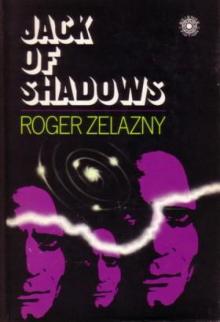 Jack Of Shadows
Jack Of Shadows Lord of Light
Lord of Light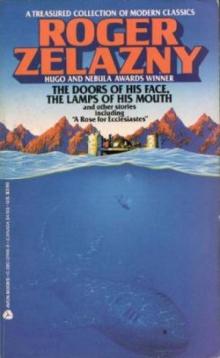 The Doors of His Face, The Lamps of His Mouth and Other Stories
The Doors of His Face, The Lamps of His Mouth and Other Stories Guns Of Avalon tcoa-2
Guns Of Avalon tcoa-2 Coils
Coils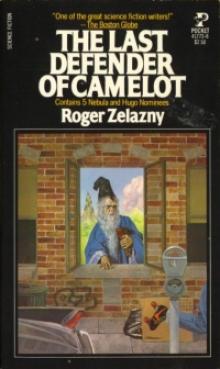 The Last Defender Of Camelot
The Last Defender Of Camelot Creatures of Light and Darkness
Creatures of Light and Darkness This Immortal
This Immortal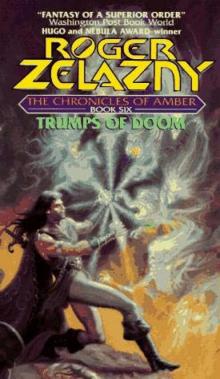 Trumps of doom tcoa-6
Trumps of doom tcoa-6 The Dream Master
The Dream Master The Complete Dilvish, The Damned
The Complete Dilvish, The Damned Nine Princes in Amber
Nine Princes in Amber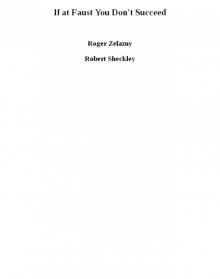 If at Faust You Don't Succeed
If at Faust You Don't Succeed Here there be dragons
Here there be dragons The Doors Of His Face, The Lamps Of His Mouth
The Doors Of His Face, The Lamps Of His Mouth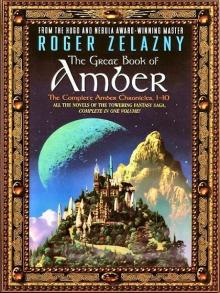 The Great Book of Amber - Chronicles 1-10
The Great Book of Amber - Chronicles 1-10 Madwand (Illustrated)
Madwand (Illustrated) The Chronicles of Amber
The Chronicles of Amber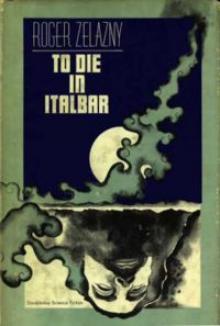 To Die In Italbar
To Die In Italbar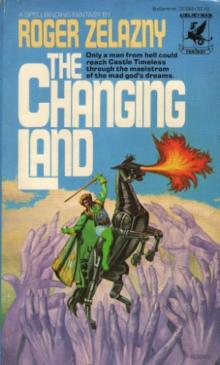 The Changing Land
The Changing Land The Furies
The Furies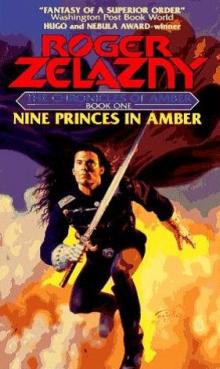 Nine Princes In Amber tcoa-1
Nine Princes In Amber tcoa-1 Last Of The Wild Ones
Last Of The Wild Ones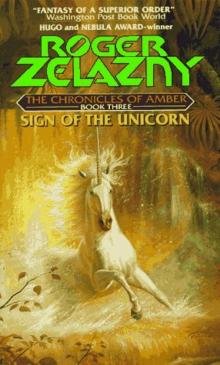 Sign of the Unicorn tcoa-3
Sign of the Unicorn tcoa-3 My Name is Legion
My Name is Legion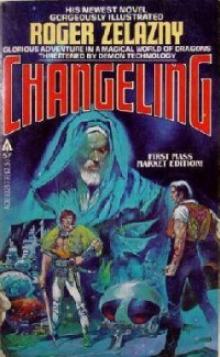 Wizard World 1: Changeling
Wizard World 1: Changeling Changeling
Changeling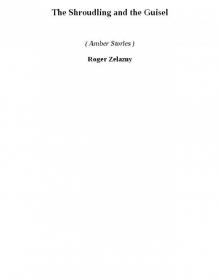 The Shroudling and the Guisel (amber stories)
The Shroudling and the Guisel (amber stories)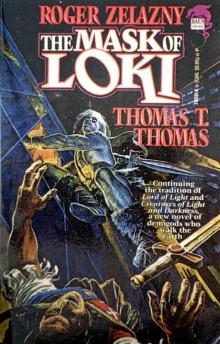 The Mask of Loki
The Mask of Loki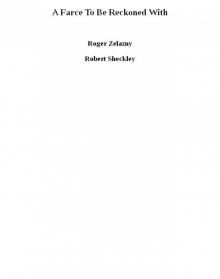 A Farce To Be Reckoned With
A Farce To Be Reckoned With Roadmarks
Roadmarks When Pussywillows Last in the Catyard Bloomed (rtf)
When Pussywillows Last in the Catyard Bloomed (rtf) Hall of Mirrors (amber stories)
Hall of Mirrors (amber stories) Permafrost
Permafrost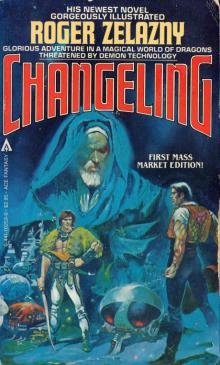 Changeling (Illustrated)
Changeling (Illustrated) Donnerjack
Donnerjack Shadows & Reflections: A Roger Zelazny Tribute Anthology
Shadows & Reflections: A Roger Zelazny Tribute Anthology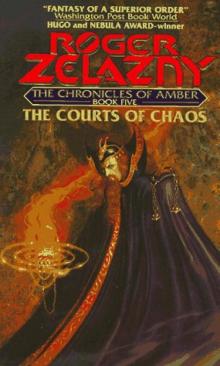 The Courts Of Chaos tcoa-5
The Courts Of Chaos tcoa-5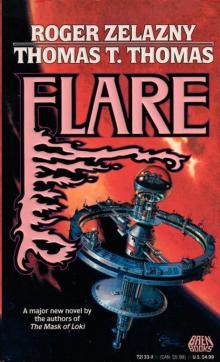 Flare
Flare Doorsways in the Sand
Doorsways in the Sand The Great Book of Amber
The Great Book of Amber Home Is the Hangman
Home Is the Hangman For a Breath I Tarry
For a Breath I Tarry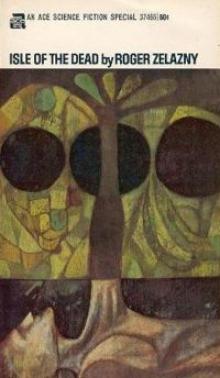 Isle Of The Dead
Isle Of The Dead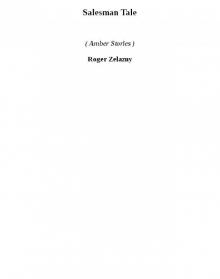 Salesman Tale (amber stories)
Salesman Tale (amber stories) Dismal Light
Dismal Light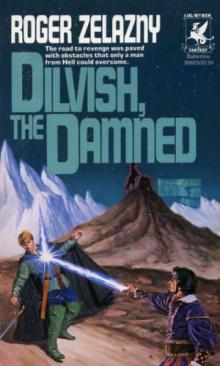 Dilvish, The Damned
Dilvish, The Damned The Black Throne
The Black Throne Wizard World 2: Madwand
Wizard World 2: Madwand The Salesman's Tale
The Salesman's Tale